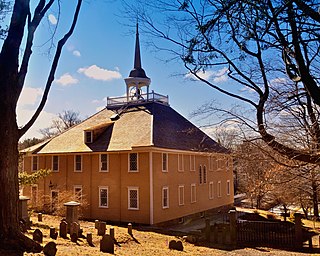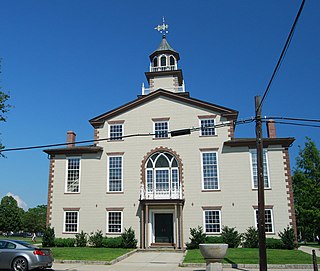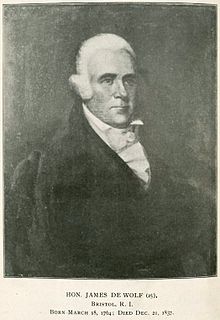
Stephen Hopkins was a governor of the Colony of Rhode Island and Providence Plantations, a Chief Justice of the Rhode Island Supreme Court, and a signer of the Declaration of Independence. He was from a prominent Rhode Island family, the grandson of William Hopkins who served the colony for 40 years as Deputy, Assistant, Speaker of the House of Deputies, and Major. His great grandfather Thomas Hopkins was an original settler of Providence Plantation, sailing from England in 1635 with his cousin Benedict Arnold who became the first governor of the Rhode Island colony under the Royal Charter of 1663.

Benjamin Bourne was an American jurist and politician from Bristol, Rhode Island. He represented Rhode Island in the U.S. House of Representatives and served as a judge in both the federal district and federal appellate courts.
John Collins, was the third Governor of the U.S. state of Rhode Island from 1786 to 1790. He was the last Independent to serve as Governor of Rhode Island until Lincoln Chafee (2011–2015).
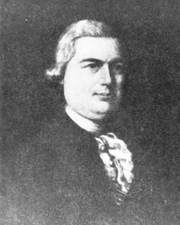
Theodore Foster was an American lawyer and politician from Rhode Island. He was a member of the Federalist Party and later the National Republican Party. He served as one of the first two United States Senators from Rhode Island and, following John Langdon, served as dean of the Senate.

Samuel Ward was an American farmer, politician, Supreme Court Justice, Governor of the Colony of Rhode Island and Providence Plantations, and delegate to the Continental Congress. He was the son of Rhode Island governor Richard Ward, was well-educated, and grew up in a large Newport, Rhode Island family. After marrying, he and his wife received property in Westerly, Rhode Island from his father-in-law, and the couple settled there and took up farming. He entered politics as a young man and soon took sides in the hard-money vs. paper-money controversy, favoring hard money or specie. His primary rival over the money issue was Providence politician Stephen Hopkins, and the two men became bitter rivals—and the two also alternated as governors of the Colony for several terms.

LeBaron Bradford Colt was a United States Senator from Rhode Island and a United States Circuit Judge of the United States Court of Appeals for the First Circuit and of the United States Circuit Courts for the First Circuit and previously was a United States District Judge of the United States District Court for the District of Rhode Island.

David Cobb was a Massachusetts physician, military officer, jurist, and politician who served as a U.S. Congressman for Massachusetts's at-large congressional seat.

Dwight Foster was an American lawyer and politician from Massachusetts. He served in the Massachusetts House of Representatives, the United States House of Representatives and the United States Senate.

William Hunter was an American politician and diplomat and namesake/owner of the Hunter House museum.
William West was an American militia general in the American Revolutionary War, Justice of the Rhode Island Supreme Court, Deputy Governor of Rhode Island, and anti-federalist leader. West also was a party in the first U.S. Supreme Court decision in 1791, West v. Barnes.

Nicholas Cooke was a governor of the Colony of Rhode Island and Providence Plantations during the American Revolutionary War, and after Rhode Island became a state, he continued in this position to become the first Governor of the State of Rhode Island. Born in the maritime town of Providence, he early in life followed the sea, eventually becoming a Captain of ships. This occupation led him to become a merchant, becoming highly successful in this endeavor, and he ran a distillery and rope-making business as well. He is depicted as one of the affluent merchants in John Greenwood's satirical painting from the 1750s entitled Sea Captains Carousing in Surinam.
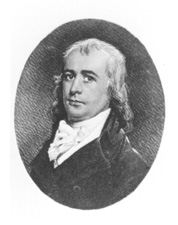
Ray Greene was a United States Senator and Attorney General from Rhode Island during the early days of statehood.
Major William Bradford was a political and military leader in Plymouth Colony in the late 17th century.
William Baylies was a U.S. Representative from Massachusetts, and brother of congressman Francis Baylies. His great-grandfather was Thomas Baylies, an ironmaster from Coalbrookdale, England, who emigrated to Boston in 1737.
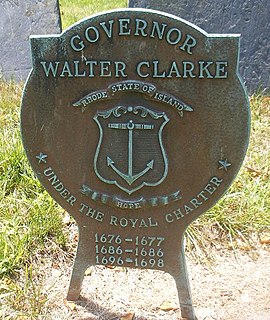
Walter Clarke (1640–1714) was an early governor of the Colony of Rhode Island and Providence Plantations and the first native-born governor of the colony. The son of colonial President Jeremy Clarke, he was a Quaker like his father. His mother was Frances (Latham) Clarke, who is often called "the Mother of Governors." While in his late 20s, he was elected as a deputy from Newport, and in 1673 was elected to his first of three consecutive terms as assistant. During King Philip's War, he was elected to his first term as governor of the colony. He served for one year in this role, dealing with the devastation of the war, and with the predatory demands of neighboring colonies on Rhode Island territory during the aftermath of the war.
Thomas Carpenter III was born October 24, 1733 in Rehoboth, Province of Massachusetts and died April 26, 1807 in Rehoboth. He was an American Revolutionary War officer who served as a colonel in the Massachusetts Militia and commanded the First Bristol Regiment from 1776 to 1780. Carpenter was elected as a delegate in 1774 to represent Rehoboth for the Massachusetts Provincial Congress and was elected Deputy to the General Court of Massachusetts in 1775.
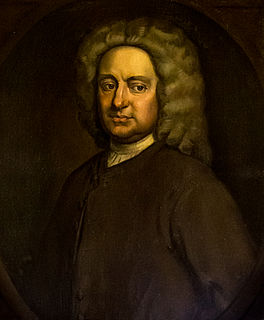
William Greene Sr. was a governor of the Colony of Rhode Island and Providence Plantations. He was a clerk of the county court in Providence, deputy from Warwick, speaker of the Rhode Island Assembly, and then deputy governor from 1740 to 1743. He became governor for the first time in 1743 and served four separate terms for a total of 11 years, and died while in office during his final term.
John Greene Jr. was a deputy governor of the Colony of Rhode Island and Providence Plantations who spent almost his entire adult life in the public service of the colony. Born in England, he was the son of John Greene Sr. and Joan Tattersall, and sailed to New England with his parents in 1635 aboard the ship James. His father, after coming from Massachusetts to Providence, became one of the original settlers of Warwick. In 1652 Greene served in his first public role as a commissioner from Warwick, and served in some public capacity every year until 1690 when he was first chosen as deputy governor of the colony. He then served 10 consecutive one-year terms in this capacity, retiring from public service in 1700 at the age of 80. He was one of the 10 Assistants named in the Royal Charter of 1663, which would become the basis for Rhode Island's government for nearly two centuries. During the devastating events of King Phillips War, Greene was one of 16 prominent inhabitants of the colony whose counsel was sought by the General Assembly.

Joseph Jenckes was a deputy governor and governor of the Colony of Rhode Island and Providence Plantations.

William Greene Jr. was the second governor of the state of Rhode Island, serving in this capacity for eight years, five of which were during the American Revolutionary War. From a prominent Rhode Island family, his father, William Greene Sr., had served 11 terms as a colonial governor of Rhode Island. His great-grandfather, John Greene Jr. served for ten years as deputy governor of the colony, and his great-great-grandfather, John Greene Sr. was a founding settler of both Providence and Warwick.






